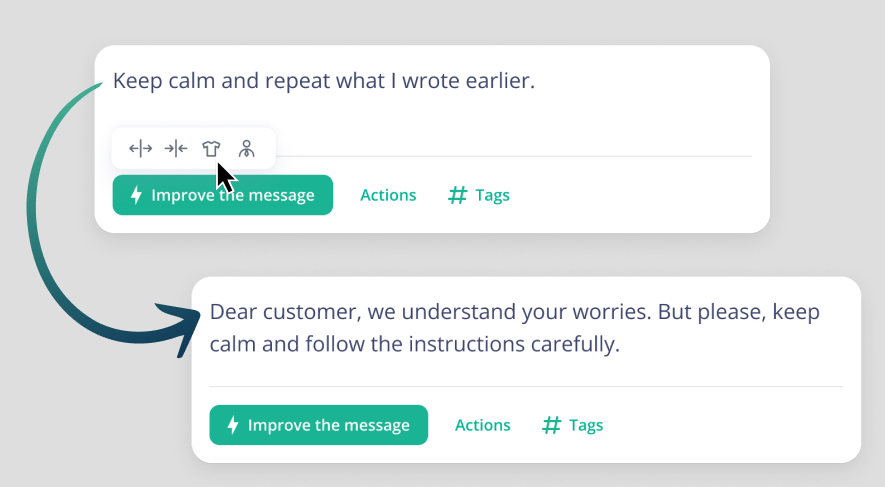Companies strive to automate as many processes as possible in the work of their support teams. And artificial intelligence (AI) is increasingly used for these purposes. We have studied the trends related to the use of AI in customer service and share our findings in this article.
We based our research on the recent study called ‘The State of AI in Customer Service’, and mixed it with our own experience. The authors surveyed over 1,000 customer support professionals, including managers, and formulated five main trends.
We based our research on the recent study called ‘The State of AI in Customer Service’, and mixed it with our own experience. The authors surveyed over 1,000 customer support professionals, including managers, and formulated five main trends.
Trend 1: Companies are increasingly investing in AI for customer service, and they have great opportunities ahead of them.
Businesses realize the importance of modern tools and actively integrate them into their technological stack. And those who haven't yet done so plan to invest in integration in the near future.
One reason for such enthusiasm is the emergence of the ChatGPT, which is able to find and analyze information, write articles, translate texts, and much more. About half of the surveyed respondents feel that they’re behind when it comes to implementing AI solutions.
Businesses realize the importance of modern tools and actively integrate them into their technological stack. And those who haven't yet done so plan to invest in integration in the near future.
One reason for such enthusiasm is the emergence of the ChatGPT, which is able to find and analyze information, write articles, translate texts, and much more. About half of the surveyed respondents feel that they’re behind when it comes to implementing AI solutions.
Trend 2: The role of people in customer service is changing, but it does not become less significant.
This is perhaps one of the main trends. Many are concerned that AI may completely replace some employees. However, a more convincing opinion is that algorithms will change work processes and contribute to the emergence of new professions. For example, neuroartists have already entered the market, working with neural networks such as MidJourney and Stable Diffusion. There're also content moderators who filter information received from algorithms.
In customer service, humans will also continue to play a key role, and AI will only help them be more creative and find solutions to complex problems faster. Proof of this is the integration of the helpdesk system Pulsedesk with ChatGPT. The tool allows support agents to adjust their responses depending on the situation and maintain the company's tone of voice.
It works like this. The operator writes a response to the customer's question and clicks on the ‘Improve message’ button. The system offers them to perform one of the actions: ‘Expand your reply’, ‘Shorten your reply’, ‘Friendly tone’, and ‘Business tone’. They choose, and AI improves the message. Before sending, the response can be edited.
This is perhaps one of the main trends. Many are concerned that AI may completely replace some employees. However, a more convincing opinion is that algorithms will change work processes and contribute to the emergence of new professions. For example, neuroartists have already entered the market, working with neural networks such as MidJourney and Stable Diffusion. There're also content moderators who filter information received from algorithms.
In customer service, humans will also continue to play a key role, and AI will only help them be more creative and find solutions to complex problems faster. Proof of this is the integration of the helpdesk system Pulsedesk with ChatGPT. The tool allows support agents to adjust their responses depending on the situation and maintain the company's tone of voice.
It works like this. The operator writes a response to the customer's question and clicks on the ‘Improve message’ button. The system offers them to perform one of the actions: ‘Expand your reply’, ‘Shorten your reply’, ‘Friendly tone’, and ‘Business tone’. They choose, and AI improves the message. Before sending, the response can be edited.
Done! Here's how the original text changed after clicking the ‘Business style’ button:

By learning to work with ChatGPT, employees will be able to process requests much faster. At the same time, customers are unlikely to know that they are interacting with a neural network.
It turns out that AI technologies can become part of the support team and take on the following tasks:
As for new professions in this field, according to experts, developers and analysts of chatbots, chatbot strategists, and designers of user dialogs will be in demand in the near future.
It turns out that AI technologies can become part of the support team and take on the following tasks:
- Quickly immerse employees in the context of dialogs.
- Give them recommendations and tips on handling tickets.
- Automate repetitive actions.
- Promptly prepare answers to customer questions based on information from existing knowledge bases.
- Assign tasks to specific specialists if necessary.
- And so on.
As for new professions in this field, according to experts, developers and analysts of chatbots, chatbot strategists, and designers of user dialogs will be in demand in the near future.
Trend 3. Efficiency is becoming more significant than ever, and AI is becoming a key factor.
Chatbots have become an important part of customer service. Thanks to natural language processing technology, they can understand complex customer requests and offer effective solutions. They can also work with multiple applicants simultaneously, thereby reducing waiting time.
One more advantage is that chatbots have no time limitations, which means that clients can receive support around the clock, at least for standard requests. Thanks to all of this business owners can optimize their resources and become more customer-oriented.
Chatbots have become an important part of customer service. Thanks to natural language processing technology, they can understand complex customer requests and offer effective solutions. They can also work with multiple applicants simultaneously, thereby reducing waiting time.
One more advantage is that chatbots have no time limitations, which means that clients can receive support around the clock, at least for standard requests. Thanks to all of this business owners can optimize their resources and become more customer-oriented.
Trend 4. AI and automation are improving the customer experience and providing a competitive advantage for businesses.
Customers value both speed and quality of service, and in this case, AI can also become an invaluable assistant. With the help of AI, companies can automate a large part of the service processes. This reduces problem-solving time and increases employee productivity, thus bringing additional benefits to the business. For example.
Customers value both speed and quality of service, and in this case, AI can also become an invaluable assistant. With the help of AI, companies can automate a large part of the service processes. This reduces problem-solving time and increases employee productivity, thus bringing additional benefits to the business. For example.
- Reduced costs. Process automation allows handling a greater number of tickets using fewer resources.
- More satisfied customers. They receive the necessary information much faster and are more likely to return to the company or share their positive experience.
- No burnt-out employees. AI takes on the execution of routine tasks, allowing operators to focus on what interests them and matches their skills.
Trend 5. There is a ‘readiness gap for AI’: managers perceive new technologies with greater enthusiasm than ordinary employees.
Support service managers generally have enthusiasm for using AI. However, some employees may experience resistance or concerns about the implementation of new technologies in their work. It's necessary to communicate with them and convey the value of the changes.
Here are a few recommendations to help start implementing AI in customer support work.
So, AI is unlikely to replace support employees, especially key ones, but it can definitely help strengthen and scale the business and create a base for new standards in customer service.
Support service managers generally have enthusiasm for using AI. However, some employees may experience resistance or concerns about the implementation of new technologies in their work. It's necessary to communicate with them and convey the value of the changes.
Here are a few recommendations to help start implementing AI in customer support work.
- Formulate the results you need to achieve. It is worth developing an investment return plan that clearly shows the amount of resources needed and the potential benefit.
- Decide how exactly to integrate AI into your technology stack. It's important to strike a balance between the desire for novelty and quality, and most importantly, security.
- Test the technologies. It's better to abandon what is actually unnecessary during the testing phase than during the implementation process.
So, AI is unlikely to replace support employees, especially key ones, but it can definitely help strengthen and scale the business and create a base for new standards in customer service.









